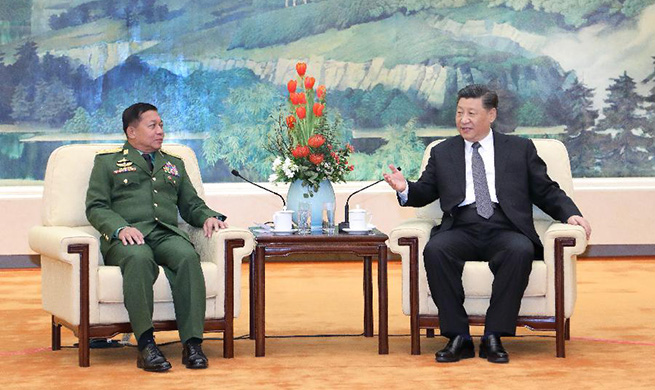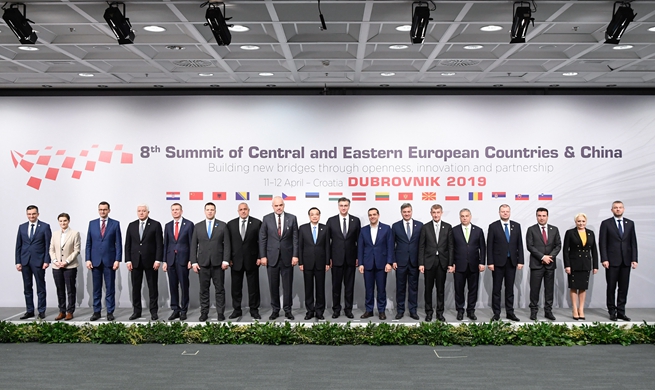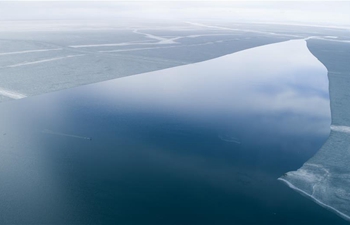ISTANBUL, April 14 (Xinhua) -- Turkey stands little chance of obtaining much-needed loans for its ailing economy from international funds or the International Monetary Fund (IMF) without heeding the U.S. demands regarding issues like Ankara's purchase of Russian S-400 missiles which are roiling bilateral ties, analysts told Xinhua.
Ankara would not manage to get even a cent unless Washington is content with its position on the S-400 deal and the U.S.-backed Kurdish forces in Syria, said Gokhan Capoglu, chairman of the Ankara-based Anatolian Strategic Research Foundation.
Turkish Finance Minister Berat Albayrak addressed around 400 investors in a meeting in Washington D.C. on Thursday in a bid to attract foreign capital into debt-stricken Turkish economy.
He also had talks with representatives of some international funds and U.S. Treasury Secretary Steven Mnuchin, and attended meetings of the IMF, the World Bank and G-20 countries during his visit to the United States.
Washington wants Turkey to remain subordinate to it as an NATO ally, said Capoglu.
Ties between the two allies have long been strained over an array of issues, including Ankara's attempt to buy the S-400 air defense system and Washington's military support for the Kurdish militia in Syria which Ankara sees as a terror group.
Washington's attitude would be more decisive as far as capital inflows into Turkey are concerned other than those managed by private financial institutions, said Aziz Konukman, a professor of economics with Ankara Haci Bayram Veli University.
The U.S. may prevent the IMF and the World Bank, over which it has much sway, from offering loans to Turkey if the bones of contention between them remain unsettled, the professor remarked.
Despite Washington's increasing pressure, Ankara has repeatedly vowed not to drop the S-400 deal concluded at the end of 2017.
The U.S. said Turkey would risk sanctions if it follows through the S-400 deal which may compromise NATO's security.
Jogn Sitilides, an adviser to the U.S. State Department, told U.S. media on Friday that President Donald Trump would economically punish Ankara if the S-400 deal is not scrapped.
Turkey is scheduled to get the first batch of the long-range air defense system in July.
Noting the Turkish economy is highly fragile, Sitilides then threateningly added that Turkish President Recep Tayyip Erdogan should be careful not to cause havoc in the economy for the sake of fueling anti-American sentiment among the Turkish public.
Sitilides' remarks echoed those by Trump who threatened back in January to "devastate Turkey economically" if Ankara would attack the U.S.-backed Kurdish militia in Syria.
Turkey suffered economically last summer, with its currency devalued by as much as 30 percent, after the U.S. imposed sanctions on its ally amid disputes over an American pastor.
Ankara has repeatedly said it would not tolerate the presence of the militia, known as the People's Protection Units (YPG), along its border, but it has withheld action against it amid ongoing talks with Washington.
The U.S. offered to establish a 20-mile buffer zone on the Syrian side of the border in a bid to eliminate Ankara's security concerns about the YPG, which Ankara says is the Syrian branch of the outlawed Kurdistan Workers' Party.
Ankara wants to be in full charge of the buffer zone, while the U.S. reportedly favors a multinational military task force which may not include Turkey.
While international public funds may not be easy for Ankara, private funds would also look for a green light from the IMF for short-term capital inflows into Turkey, though their decisions would essentially be based more on how many profits they would get, argued Konukman.
Turkey is in need of huge foreign capital, as much as around 200 billion U.S. dollars in 2019, to run its debt-stricken economy amid high inflation and unemployment and signs of recession.
In the view of Capoglu, also an economist by profession, how the private funds would respond to Turkish efforts to attract foreign capital would be largely dependent on Washington's attitude as well.
"I can't imagine the financial circles acting contrary to the wishes of the U.S. deep-state," he said.
Amid signs of a worsening economic crisis, the Turkish economy shrank by 3 percent in the last quarter of 2018 year-on-year.
The Turkish government expects the economy to grow by 2.3 percent this year, but the economy may shrink by around 2 percent, according to the IMF and the Organization for Economic Cooperation and Development.
Both analysts argued that Turkey's deficiency in legal certainty and the rule of law is also a major factor limiting direct foreign investors' interest in the country.
"The economy does not function properly in a country where the rule of law is not respected," remarked Capoglu.
"Even if the tension with Washington should ease, Turkey cannot easily attract foreign direct investments unless legal certainty is ensured," stressed Konukman.













